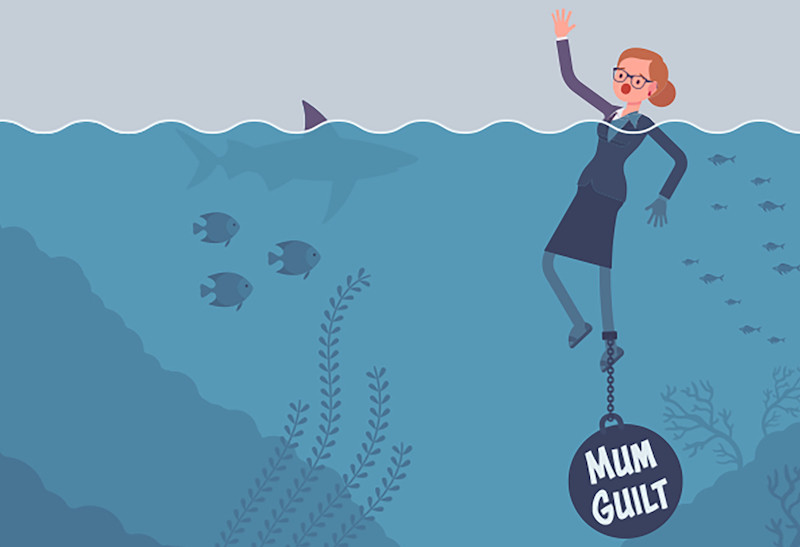Mothers feel all sorts of emotions. The love that wells up in you when you gaze at your child’s peacefully sleeping face. The joy that bubbles out of you when you hear their highly infectious giggles. But nothing quite beats, or rather, tops the achingly painful feeling of guilt.
Mum guilt, to be precise.
As the bestselling author of numerous pregnancy and parenting books, Kaz Cooke, once said, “Mothers can do no right . . . when you are a new mum [at a hospital] and when they give you a bag with wet wipes and a few things in it, they should put a packet in there marked ‘Guilt’.”
Or as Arianna Huffington, founder of The Huffington Post, puts it, “They take the baby out, and they put the guilt in!” and it often feels like that. We worry about everything.
Unlike baby brain, which science has proven actually exists, mum guilt is a condition that isn’t technically real, but universally felt by practically every single mother.
It doesn’t matter whether you’re a stay-at-home mum or a working mother. It doesn’t matter if you have a new baby or a teenager. It doesn’t matter whether you avoid social media and all the #blessedmum posts, or can happily ignore what family, friends or even random strangers say in real life.
My son is almost four years old and having guilty feelings has become part of my day-to-day life.
Should I be feeding him that?
Is he having too much screen time?
I really need to ignore the dishes to spend time with him.
Why can’t I keep a tidier, more organised house?
Am I disadvantaging him by not doing [insert activity of choice here] with him?
Megan Dalla-Camina is a women’s mentor and coach, and the author of Simple Soulful Sacred. She talks about the deeper questions most mums ask themselves that can cause feelings of guilt.
“There’s the invisible damage we think we are doing to our kids day in and day out—even when we’re trying our hardest to do the very best we can,” she says. “We can also struggle with the question, Are we even doing it right in the first place? Not to mention the judgement and sideward glances everyone seems to make about our choices.”
Mothers often feel bad about every single decision they make and for some of us, it’s just become part and parcel of who we are. But what if the guilt stems from—or even leads to—a darker place?
When guilt leads to shame
Megan Jaworski, a mother of two toddler boys, a teacher and a mindset specialist coach, is all-too-familiar with mum guilt.
The problem she says, however, is when what we’re experiencing is—or what we experience eventually leads to—mum shame. Feelings of mum shame can often come in the form of feelings of unworthiness around being a parent, our lovability and our ability to handle any given situation. (Scroll to the end for a more detailed list of differences between guilt and shame.)
“Brené Brown, a leading researcher in shame and vulnerability, claims that the best way to move through our shame is by being vulnerable,” says Megan. “This can be increasingly difficult for mothers, especially given the pressures to be the perfect parent thanks to social media. The greater the comparisons we experience, the more guilt we will feel—and if these feelings are not monitored, they can lead to shame.”
8 ways to deal with mum guilt

Are you ready to stop questioning yourself, doubting if you’re doing a good job and feel better about being a mum?
Both Megans (Dalla-Camina and Jaworski) have several simple ways in which you can tackle mum guilt, practise vulnerability and overcome shame.
1. Be present
Megan Dalla-Camina: We’re all so distracted these days, with our heads and minds in our emails, social media and lengthy to-do lists. When you’re with your kids, be present. It’s really not about the amount of time, but the little moments. Be present in the time you have. Put your phone away. Turn the TV off. Do some activities together, even if it’s just the stuff that must get done, like cooking dinner or doing some gardening. When you’re there, really be there.
2. Focus on the positive
Megan Dalla-Camina: Mummy guilt comes from worrying about all of the things that you think you aren’t doing, like school events you’ve missed while working or looking after younger siblings. You can spend all of your time and energy on those thoughts, or you can choose to shift your mindset and focus onto the things you know you’re doing right (no matter how small they are). Ignore the self criticisms. Look at all the times you are there, the fun you have, the events you make it to. And let that guilt go.
3. Tune in
Megan Dalla-Camina: Our role as mothers is to meet the unique needs of our children in the best way we can. Every child is different. With two siblings, one might need a lot of reassurance and constant encouragement, and the other may be fine left to their own devices. Being attuned is all about the art of listening and noticing, and it’s something that women and mothers are especially good at. Spend some quiet time with your children each week—it could just be 10 minutes alone time—to ask how they’re going and really listen for the answer.
4. Meet your own needs too
Megan Dalla-Camina: Stop being so hard on yourself. It’s OK to admit that it’s hard, this raising of little humans. Remind yourself that you’re doing your best and create space to look after yourself. Self care is crucial for you to be a good mother. Making time for a bath, reading your favourite book, having some quiet time in nature or catching up with a girlfriend who makes you laugh, are all important ways to nurture yourself. Make sure that you aren’t neglecting what you need and what you love while you’re tending to your children. The more restored you are, the more you have to give to them.
Megan Jaworski: Being vulnerable takes enormous courage. That’s why it’s so important to let go of the worry of what others think of you and demonstrate self-compassion. It might not come naturally at first, which is why it’s important to make it a daily practice. You can begin by starting with these mantras:
- I forgive myself
- I am compassionate to myself at all times
- I am worthy of love
- I learn from my experiences
- I let go of what doesn’t serve me
- I accept myself in this moment as I am
5. Speak out
Megan Jaworski: It’s important to share how you’re feeling to those you trust—not publicly on social media, especially if you’re still dealing with your shame. Don’t worry about being the perfect parent because there isn’t one. And once you’ve moved through your shame, your story can also empower others.
6. Surround yourself with positive people
Megan Jaworski: We are the product of the five closest people in our lives. Therefore, surround yourself with those who focus on modifying their behaviour, not on making their behaviour who they are or shaming others for their behaviour.
7. Learn from your guilt
Megan Jaworski: Use your guilt to feel compassion. Ask yourself, What can I learn from this?, How can I grow as a result of this? and Who do I need to be to get through this? And believe you have what it takes to move forward.
8. Ask for what you need
Megan Jaworski: You can’t get what you don’t ask for. Jesus Himself said, “Ask and it will be given to you; seek and you will find; knock and the door will be opened to you. For everyone who asks receives; the one who seeks finds; and to the one who knocks, the door will be opened.”
It’s important to know what you want and need in order to be the best person you can be. Be clear with how others can support you. Establish well-defined boundaries around this. And remember, sometimes, that support comes in the form of professional help. There is no shame in looking after your own mental health.
“Motherhood is filled with unique challenges and also filled with so much light and joy,” says Megan Dalla-Camina. “Becoming the mother—and woman—you want to be is about parenting on your own terms, defining success for yourself and doing it your way. It’s also about looking after yourself, your needs and your life in the process. Remember, you don’t stop being you when you have kids. Try to find that balance, even if it’s in the smallest moments.”
Differences between guilt and shame
Shame
- When our actions are not separate to our identity
- We believe we are our behaviour
- Most commonly shows up in a parent-child relationship
- Focus is on self
- Highly correlated to addiction, depression, suicide, eating disorder, aggression, bullying and suicide
- Linked to personal distress
- When we experience shame, we believe that:
- I am a bad mother
- I’m so stupid
- I’m too weak
- I’m fat and disgusting
- I’m a mistake
- I’m unworthy
- I can’t handle this
- I’m too angry
Guilt
- Focus is on behaviour, not self
- Our actions are separate to our identity
- Works as a compass for how we should behave or what we’ve done wrong
- Helps us see from a different perspective
- Helps us modify our behaviour for next time
- Doesn’t blame
- When we experience guilt, we believe that:
- I made a mistake
- I did something wrong
- I felt anger
- Although I’ve made a mistake, I have the ability to make amends and then adapt my behaviour to be who I want to be instead
If you or someone you know needs help, contact:
Lifeline: 13 11 14 Australia | 0800 54 33 54 New Zealand
How helpful was this article?
Click on a star to rate it!
5 / 5. 1
Be the first to rate this post!
Melody Tan
Related posts
Subscribe
Receive personalised articles from experts and wellness inspiration weekly!

